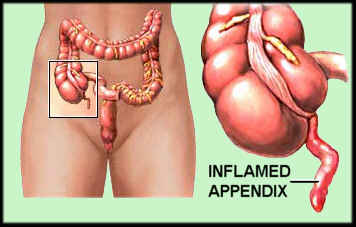
The Appendix or also known as the vermiform Appendix is a blind-ended tube that is connected to the cecum.
The Appendix or also known as the vermiform Appendix is a blind-ended tube that is connected to the cecum. It is basically a hollow tube that is closed at one end and is attached to the other end at the cecum, which is a pouch-like structure situated at the beginning of the large intestine, into which the small intestine empties the contents. It is highly diverse in its shape and size.
The Appendix is situated near the junction of the small and the large intestine. It is situated on the lower right side of the stomach.
The human Appendix varies in size. It usually averages about 11 cm in length, but it can vary or range from about 2cm to 20cm.
The main function of Appendix in the human body is still unknown. Previously it was assumed that Appendix in the human body did not possess any function and was useless. But according to the experts Appendix which is a small worm-like organ, basically acts as a storage house for the good bacteria. After the diarrheal illness, it reboots the digestive system. Other experts also believe it to have other functions like housing and cultivating of the beneficial gut flora, which basically repopulates the digestive system after recovering from an illness that usually removes out the normal population of the existing flora during the illness. The Appendix also provides as a site for the production of the endocrine cells in the fetus, which produce the molecules that are important in regulating the homeostasis (The tendency of an organism or cell to regulate its internal conditions). The Appendix also plays an important role in the immune function.
The good bacteria hide themselves in the Appendix, when the gut or the digestive tract is infected by the bad bacteria. Once the infection is gone, the good bacteria usually multiply themselves, resulting in the increased number of good bacteria in the gut.
Appendicitis is the condition in which the Appendix is inflamed, swollen or filled with pus. It occurs when the digestive tract is infected with the bad bacteria, which are passed on from consuming the contaminated food. The other reason may also include the present of a piece of stool stuck in the Appendix and the bad bacteria infecting the Appendix to fill with pus or to inflame. So when the Appendix is filled with pus or inflamed and when it causes uneasiness, the condition that is developed is known as Appendicitis.

Infection or blockage is the reason for Appendicitis. If a person has consumed any contaminated food, then the bad bacteria causes infection in the stomach, then the infection gradually reaches the Appendix, resulting in Appendicitis. Similarly if the Appendix is blocked due to the presence of a piece of stool in the Appendix, then decay of the hard stool results in the Appendix to get inflamed and fill with pus, thus resulting in Appendicitis.
When a person experiences an attack of Appendicitis, he may feel pain all over his abdomen, or around the navel. The pain is usually not very severe, but after few hours the pain may increase around the right lower abdomen. And after the increasing pain, vomiting and nausea may develop eventually.
Other symptoms also include:
-
Loss of appetite
-
High Fever (99 to 102 degrees Fahrenheit)
-
Pain in lower abdomen in the right side, while sneezing and coughing
-
Diarrhoea
-
Constipation
-
Painful urination
-
Vomiting due to abdominal pain
-
Abdominal swelling


